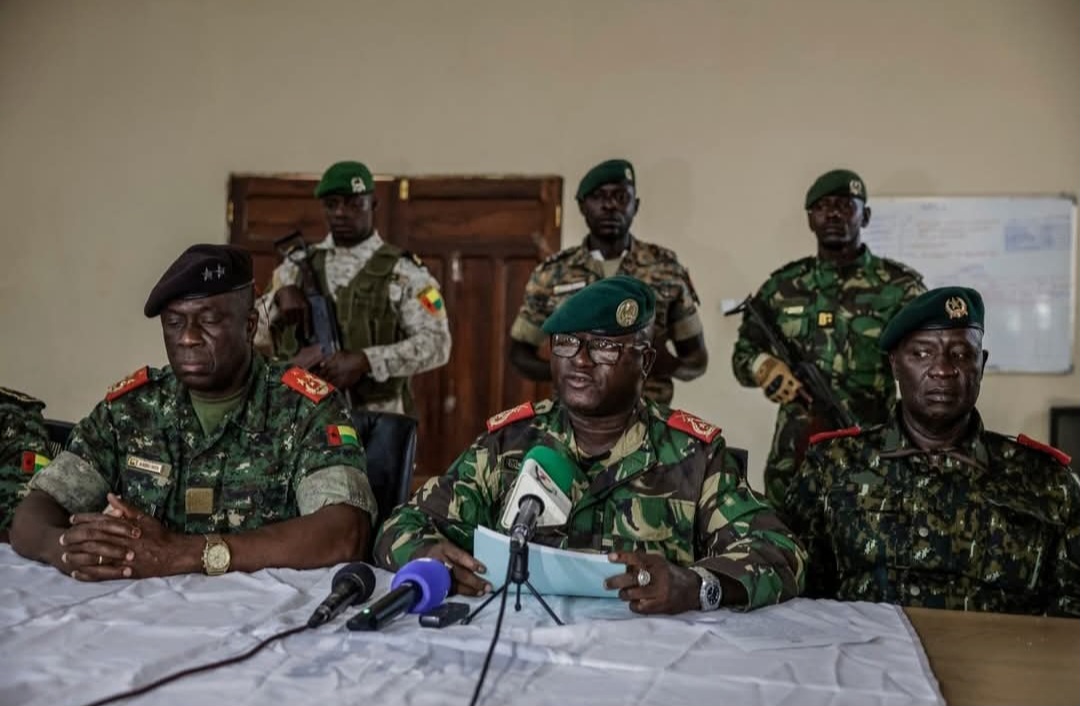
Ofure Akhigbe
Guinea-Bissau’s military on Thursday appointed its chief of staff, General Horta N’Tam, as interim leader for one year, a day after seizing power, arresting President Umaro Sissoco Embaló, and suspending the release of presidential election results, drawing sharp condemnation from the African Union (AU).
General N’Tam was sworn in at a heavily guarded ceremony at military headquarters in Bissau on Thursday. Dozens of armed soldiers were deployed as he told journalists that the takeover was necessary to “block operations that aimed to threaten our democracy.”
The coup occurred on Wednesday, when a group of senior officers announced that they had taken “total control” of the country, halting the electoral process as Guinea-Bissau awaited the results of Sunday’s presidential election, which Embaló had been widely expected to win.
On Wednesday afternoon, the head of the presidential military office, General Denis N’Canha, said the armed forces had assumed control “until further notice” after uncovering an alleged plot involving “drug lords,” which he claimed included the introduction of weapons into the country to alter the constitutional order. He also announced the suspension of all media programming and the imposition of a nationwide curfew.
All land, air and sea borders were closed following the coup on Wednesday but were reopened on Thursday, according to General Lassana Mansali.
President Embaló was arrested on Wednesday and is being held at the general staff headquarters alongside the army chief of staff and the minister of the interior, according to a senior military officer. The officer said the president was being “well treated.”
Opposition leader Domingos Simões Pereira, who was barred by the Supreme Court from contesting Sunday’s election, was also arrested on Wednesday, according to sources close to him.
Reacting on Thursday, the African Union demanded the immediate release of the detained president. In a statement posted on his X handle, AU Commission Chairperson Mahmoud Ali Youssouf called for the “immediate and unconditional release of President Embaló and all detained officials,” adding that the organisation “unequivocally condemns” the coup.
The Economic Community of West African States (ECOWAS) also on Thursday condemned the military takeover and reaffirmed its “zero tolerance for unconstitutional changes of government.”
United Nations Secretary-General António Guterres said he was following developments “with deep concern,” while Portugal, Guinea-Bissau’s former colonial ruler, urged restraint and warned against institutional and civic violence.
Sadibou Marong, director of Reporters Without Borders’ Sub-Saharan Africa office, described the suspension of media operations as a serious violation of the public’s right to information.
Guinea-Bissau, which gained independence from Portugal in 1974, has experienced four successful coups and several attempted ones. It remains one of the world’s poorest countries and a major transit hub for drug trafficking between Latin America and Europe, a trade long enabled by political instability.
Political stability dominated campaigns ahead of Sunday’s election. In October, the army said it thwarted an attempt to subvert the constitutional order and arrested several senior officers.
West Africa has witnessed a wave of military takeovers in recent years, including in Mali, Burkina Faso, Niger and Guinea.
